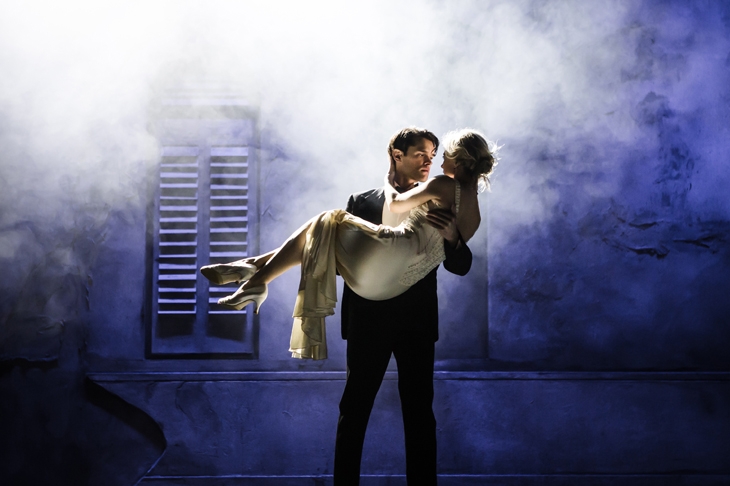It could be the nuttiest idea ever. The protagonist of this American musical is Death, who secretly reprieves a beautiful Italian princess, Grazia, and spends the weekend at her father’s palace where a house party is in full swing. The dad knows the gatecrasher’s identity. But Death introduces himself to the others as a suave Russian duke. All the womenfolk promptly fall in love with him, including Grazia, who sets out to bag the mysterious foreigner. Where can this strange plot go next?
Nowhere. Once Grazia learns that Death has come to terminate her existence the story will end. So the script is padded out with additional entanglements between a sprawling crew of sub-personalities. There’s a sulking rotter, a glamorous airman, a foxy widow, a sagacious doctor, a needy minx, a waggish footman, a nymphomaniac scullery maid and an amiable dowager in an advanced state of decay. But their complicated affairs are just delaying tactics, and we keep returning to the doomed central pair whose relationship is as stiff and conventional as a pre-arranged fix-up between royal cousins. They take rapturous lakeside strolls. They gaze adoringly into each other’s retinas. They embrace at midnight and fill the air with ardent drivel. While she tenderly fondles his shoulder blade he gawps longingly at her throat. Only two lighting conditions are permitted to illuminate their gasping intimacies, the full moon and the setting sun. Then there’s a surprise. A sexy American flapper drags Death into the drawing room and tries to seduce him with an upbeat jazz number, but the fun comes to an end and the show settles back into its grand and broody torpor.
It’s certainly great to look at. The stylish costumes by Jonathan Lipman are sumptuously done. The principals (Zoë Doano and Chris Peluso) are superb singers, and both are blessed with divine good looks. But the show keeps barking its shins against its own battiness in choosing a non-human protagonist. Why does this matter? Death, at first glance, appears quite a promising dramatic personality compared with other figurative abstractions like, for example, Magnetism, Oral Hygiene or Trigonometry. But try putting any of the last three into a musical and you’ll see the problem. And it’s unnecessary. The conflict between love and duty might have been channelled through the figure of a Bolshevik assassin who falls for the duchess he’s been ordered to liquidate. Same storyline but with more potential for realistic development.
Astronomical sums have been lavished on this show. The 14 actors are joined by a 12-piece orchestra hidden in a sort of dungeon under the stage. Oodles has been splurged on wardrobe and sets. The director Thom Southerland gets impressive performances from a cast who are not all, shall we say, West End regulars. And for what? An exquisite, opulent bore.
Poets Richard Marsh and Katie Bonna have turned their romantic memories into a rhyming play. That’s quite odd. Odder still, their rhymes entertain rather than irritate. Richard and Katie (named after the authors) meet when a stag do collides with a hen night. The pair consume a small reservoir of booze and awake the next morning in the same bed. Their romance falters but they have chums in common so they keep stumbling across one another. Richard’s best mate is a foul-mouthed Yorkshire bruiser enamoured of a honking Cockney sexpot who happens to be Katie’s oldest schoolfriend. These enjoyable twerps become the solder that gradually draws the pair back together.
The affair faces the usual misunderstandings and infidelities. Katie falls for Matt, a swaggering hunk from Eton, whose appeal Richard can never hope to match. At first I wanted the large cast to be played by the proper complement of actors but I began to relish the ingenuity of the performers (Felix Scott and Ayesha Antoine) as they alter their identities without even a change of costume to help. Shifts of pose, of gesture, of vocabulary, of accent, the subtle elongation of a vowel are all it takes to indicate a change of personnel. These are performances to treasure.
In the end the inevitable happens and Aphrodite triumphs. Those who hate soppy romances (and I love them) should avoid this show because its Richard Curtis atmosphere will send them skedaddling to the vomitorium. And though it has the satisfying storyline of a romantic movie, could it become one? A couple of snags. Rhyme is not a common idiom in film. And the script is full of little verbal flourishes whose existence is purely ornamental. Rule one of screenwriting states that every line must be cut that doesn’t either advance the story or explore the characters. And yet nowadays there’s a fad for filming the unfilmable. How it would work I don’t know but I’d lay money on this reaching the big screen.







Comments